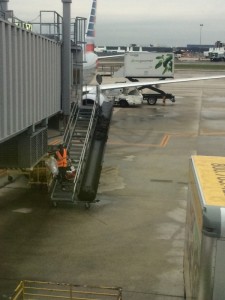Airline Ramp Serviceman Dies in Fall from Belt Loader

Below is an interesting article posted on the American Association for Justice website. East coast airport injury lawyer Doug Landau of the Virginia law firm Abrams Landau, Ltd. agrees with the article’s premise that sometimes pursuing justice for innocent victims is an uphill battle for the plaintiff’s counsel. Defendants and their counsel will try every angle to absolve themselves of any responsibility or negligence. Plaintiffs’ lawyers like Landau must be thorough and perseverant in defense of their clients.
Here is the article:
A wrongful death case by the family of a United Airlines ramp worker demonstrates how many obstacles defendants will throw into the path of plaintiff’s lawyers pursuing justice on their grieving clients’ behalf.
The Cook County, Illinois jury trial arose as the result of a ramp serviceman’s fatal on-the-job accident. The decedent, a ramp serviceman for United Airlines, was working a military charter at an Air Base in Kuwait, where the airline was delivering troops. CAV International, Inc., a South Carolina corporation, operated the base. When a Boeing 747 landed, the airline worker walked up a belt loader to the plane’s front cargo pit to unstrap the troops’ luggage. He then exited the cargo pit and grabbed onto the safety handrail to begin walking down the belt loader to the tarmac below. The CAV employee who was operating the belt loader suddenly collapsed the handrail, causing the airline worker to fall headfirst to the pavement 12 feet below.
The 64-year-old airline employee sustained a traumatic brain injury and underwent an emergency craniotomy. Six days after the incident, after tests confirmed that he had no brain activity, his family decided to terminate life support. He is survived by his wife and two adult sons. His pre-death medical expenses, including air transport back to the United States, totaled about $343,200.
The United Airlines employee’s wife, on behalf of his estate, filed a wrongful death lawsuit against CAV, alleging liability for its employee’s negligence in failing to pay attention to the belt loader and collapsing the only available handrail while the ramp worker was using it. CAV initially failed to answer and moved to dismiss for lack of jurisdiction, arguing that Illinois lacked jurisdiction because the company did not do any business in the state. The company withdrew the motion, however, after the plaintiff presented contradictory evidence.
The plaintiff’s counsel flew to Kuwait to inspect CAV belt loaders and depose company personnel, including the operator of the belt loader. Counsel then sought the military personnel who witnessed the operator’s negligence. Because their statements were redacted, their names were not known. The JAG corps ultimately produced four witnesses for videotaped testimony, however. They testified that the CAV employee had his back turned to the belt loader and was yelling and joking with military personnel on the tarmac when the handrail was collapsed in one continuous motion.
The lawsuit also named the plane’s manufacturer and the belt loader’s manufacturer, alleging that there were insufficient fall protection devices and that the safety railing did not extend to the end of the loader. The products liability defendants settled before trial for $50,000 each, and the case proceeded solely against CAV.
The remaining defendant contended that the plaintiff might have been leaning out of the cargo pit with his hand on the handrail. The defense also argued that he was negligent in failing to yell to the operator that he was getting on the belt loader. The plaintiff countered that the operator was wearing earplugs and would not have heard what the plaintiff said.
A defense expert cardiologist testified that the plaintiff was a sick man with high blood pressure who had received a heart stent in 2004 and likely would have died within nine years. The plaintiff’s expert countered that his blood pressure was controlled with medication and that he worked a tough job daily and had experienced no symptoms after receiving his stent.
Although the estate did not pursue lost earnings, the jury awarded about $7.39 million, allocating fault at 90 percent to CAV and 10 percent to the decedent. CAV is responsible for about $6.65 million.
The case is Bruce v. CAV Intl., Inc., No. 10 L 13818 (Ill., Cook Co. Cir. Feb. 14, 2014).
If you or someone you know has been injured while working for an airline or at an airport and there are questions as to what laws apply, email or call Abrams Landau, Ltd. at once (703-796-9555). We work tirelessly to seek justice for our injured airline worker clients.
